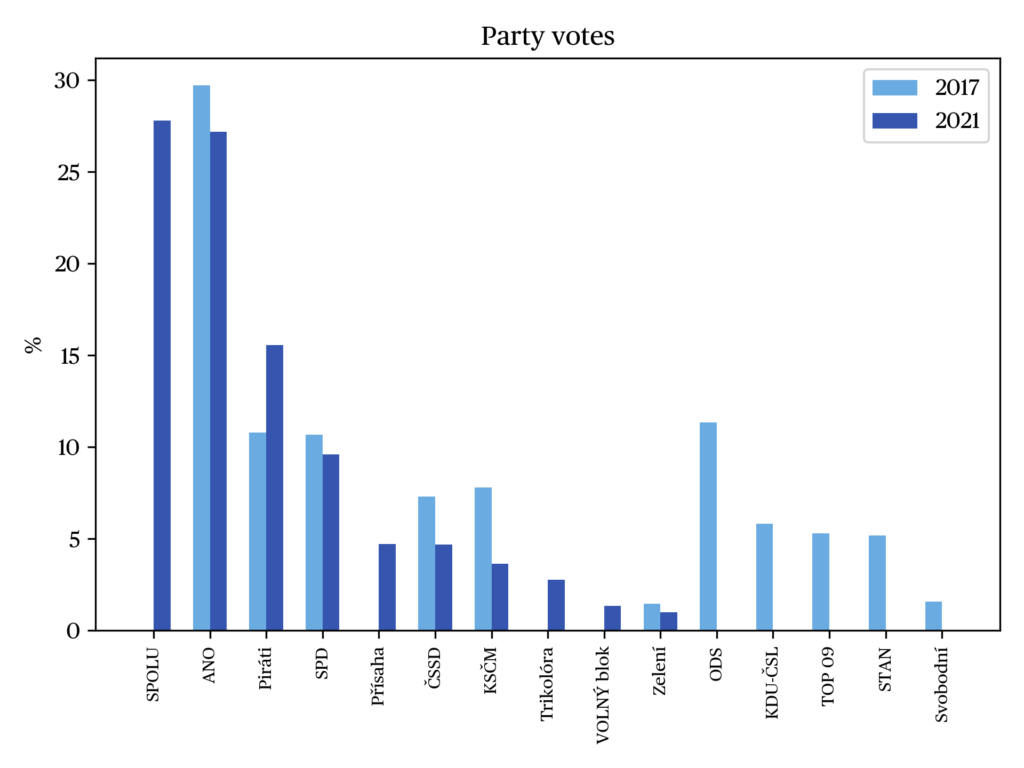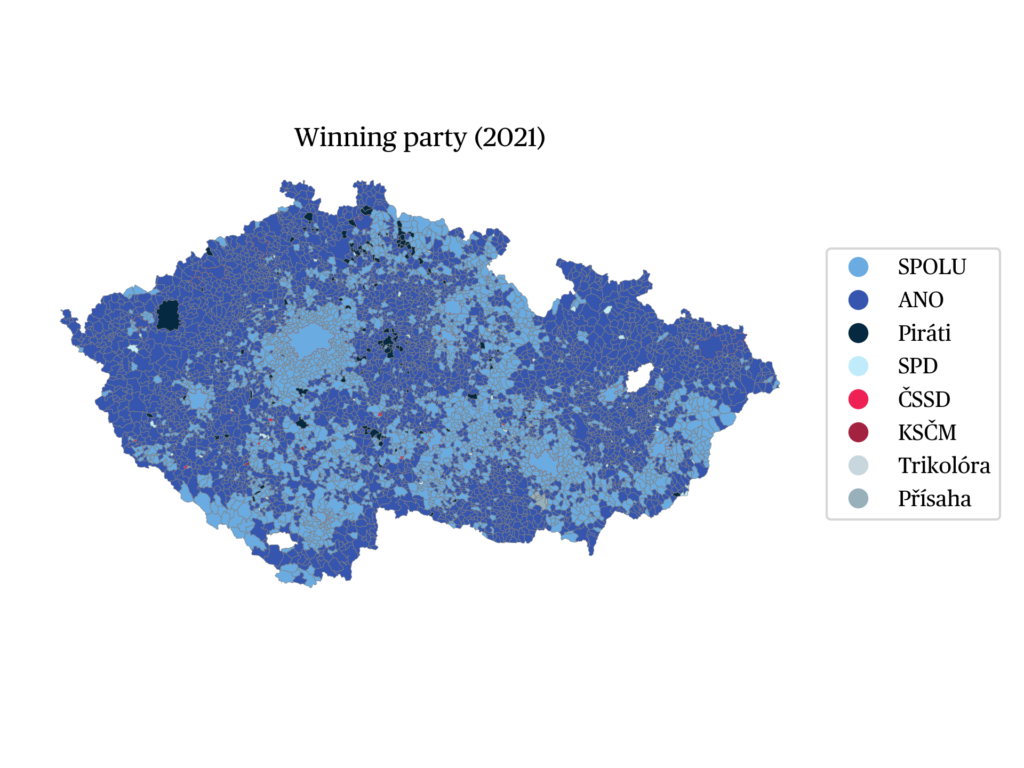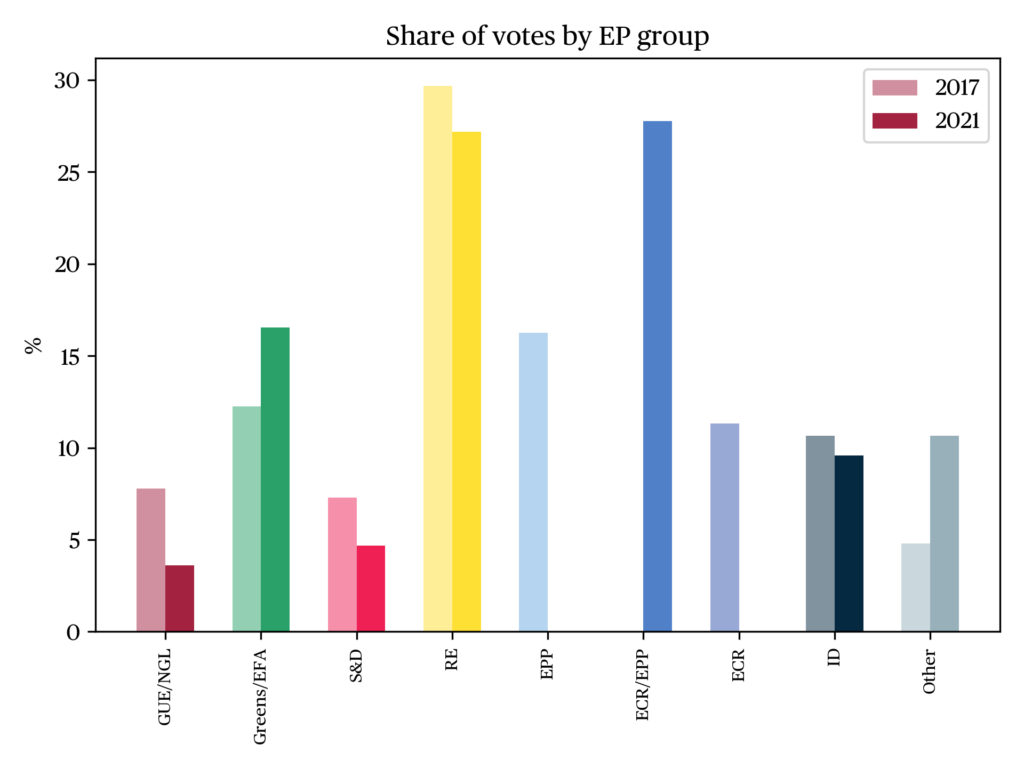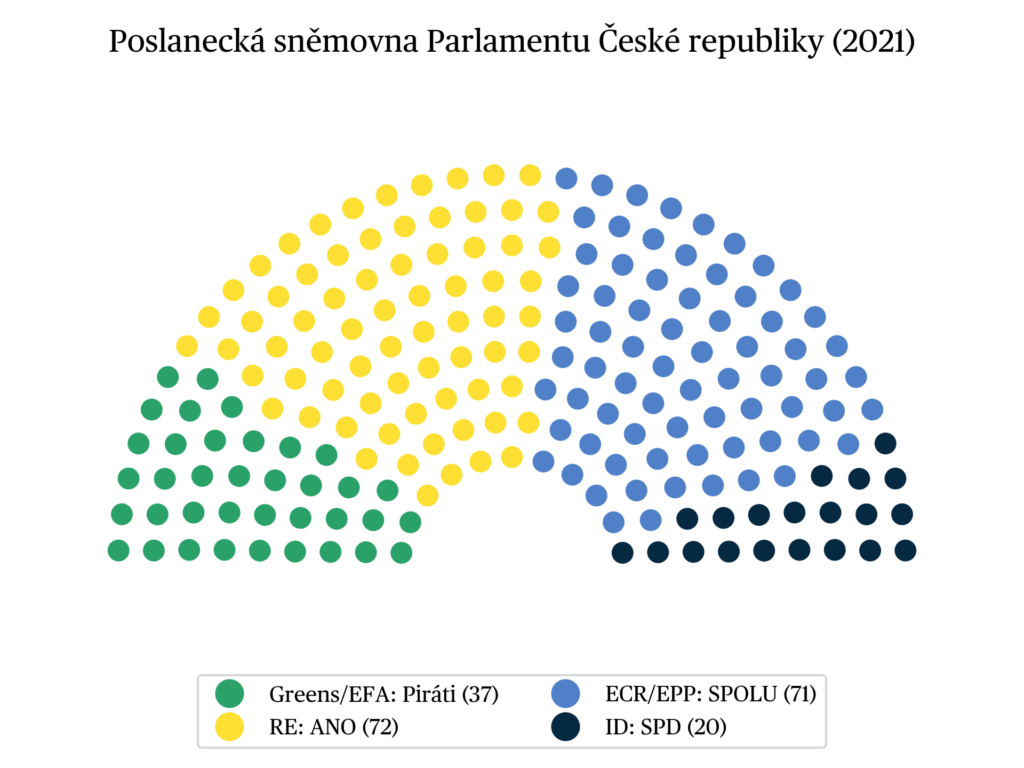Parliamentary election in the Czech Republic, 8-9 October 2021
Tomáš Weiss
Deputy Director of the Institute of International Studies, Faculty of Social Sciences at Charles UniversityIssue
Issue #2Auteurs
Tomáš Weiss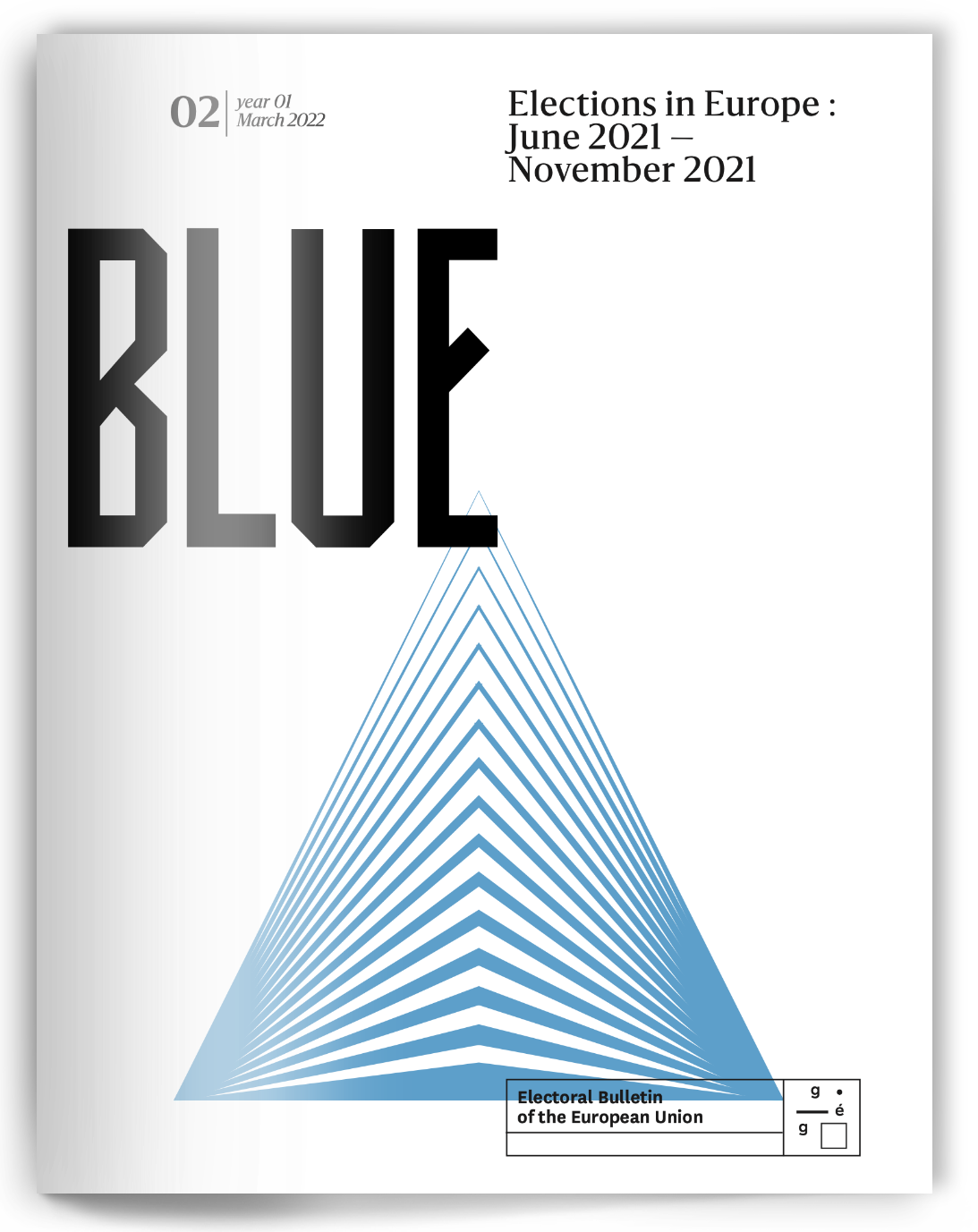
21x29,7cm - 167 pages Issue 2, March 2021 24,00€
Elections in Europe : June 2021 – November 2021
The legislative elections in Czechia on 8-9 October 2021 resulted in a significant political change. ANO (officially ANO 2011; the name originally stood for “Alliance of Dissatisfied Citizens”), the party of the PM Andrej Babiš, came a close second in terms of the popular vote, and even though it won the most mandates, it could not form a majority in the parliament. As a result, a two-coalition, or five-party government under the leadership of Petr Fiala (ODS) took office on 17 December with a comfortable majority of 108 mandates in the 200-seat lower chamber of the Czech parliament. The turnout level of 65.43 per cent was almost 5 percentage points higher than in 2017.
The legislative elections, or the elections to the Chamber of Deputies of the Czech parliament, are the most important elections in the Czech system determining the composition of the national government. The electoral system is proportionate with 14 party lists representing each of the country’s 14 regions corresponding to the NUTS3 level. A new election law adopted in 2021 introduced a two-stage allocation process employing the Imperiali and Hagenbach-Bischoff quotas.
1
There is a 5 per cent threshold that parties need to reach nation-wide in order to enter the parliament, which increases to 8 per cent for two-party coalitions and 11 per cent for three- and more party coalitions respectively. The system allows for four preferential votes within the party list with candidates that receive preferential votes of at least 5 per cent of the total votes for the party in the region jumping to the top of the list.
The elections were significant for a couple of reasons that will have short-term and long-term implications for Czech politics. Firstly, several established parties did not surpass the electoral threshold and will not be represented in the lower chamber. Secondly, the number of wasted votes was the highest since 1993, impacting the political environment. Thirdly, the unification of the liberal opposition into two coalitions has brought about unexpected results.
This short text will address the three points mentioned above and discuss their implications. Next, I will discuss the potential impact of the elections on Czech domestic politics. Finally, I will address the relevance of the election results for the Czech position in the European Union..
The disappearance of the traditional left
Despite its original liberal and business-oriented ethos in 2013 (at the EU level, the party is member of the Renew Europe group), ANO has failed to attract a stable support among young and educated voters and gradually moved to the left. It became the party of the first choice among the older generations to which it had appealed by some of its policy choices and rhetoric. Almost half of the 65+ age group voted for ANO in 2021 (Prokop et al. 2021). The result is the testimony of ANO’s good marketing strategy because several of the party’s policies, notably the tax reform adopted in late 2020, were adopted with the support of the conservative opposition despite protests of the social democrats, ANO’s coalition partners. ANO has not become a standard left-wing party but attracted enough of the left-wing vote, which had significant impact on the overall results and on the fate of several established parties.
From the longer perspective, the main takeaway will be the fact that the communist party (Communist Party of Bohemia and Moravia; Komunistická strana Čech a Moravy; KSČM) did not manage to gain a single mandate. As a result, one of the last, if not the last unreformed communist party in Central Europe disappeared from national politics. KSČM had relied on older voters and failed to attract the younger generations. Some have argued, therefore, that its demise from national politics was a matter of time. The ANO’s marketing strategy seems to have contributed to the result, however, and sped up the KSČM’s decline. Yet, it must have been very disappointing for the party and its representatives. In the previous legislative period, KSČM had found itself closest to power since 1989 because the minority ANO-ČSSD government relied on their support. We can expect KSČM to decline further and not return to national politics even though they will linger at the local level for the years to come.
Social democrats (Czech Social Democratic Party; Česká strana sociálně demokratická; ČSSD) were the second traditional left-wing party that was voted out from the Chamber of Deputies in these elections. Once a major force in Czech politics, the party paid the price for participation in ANO’s government. A large part of its electorate left for ANO, and a significant part abstained, having not understood the party’s cooperation with the prosecuted oligarch.
In effect, the ANO’s success in attracting voters from its potential allies cost Andrej Babiš a government. While ANO lost only very slightly despite having had the governmental responsibility during the pandemic, it did so at the expense of the smaller partners. In the end, ANO managed to maintain the highest number of mandates but squeezed potential allies from the parliament and remained unable to build a majority.
Wasted votes
Czechia has suffered from a very low trust in public institutions, particularly in the government and the parliament (CVVM 2021). The 2021 elections have aggravated the problem because more than 1 million votes, representing almost 20 per cent of all votes, got wasted. Such a high number, unprecedented in recent Czech history, resulted from two parties remaining just under the 5 per cent threshold and a couple of others trailing not far behind.
The high number of wasted votes enabled the two-block coalition to achieve a majority in the parliament and effectively remove Mr Babiš from power. But it also means that the government, despite the solid majority of 108 mandates, received only about 2.3 million of the 5.2 million votes cast. The governmental parties need to attract more voters to win any subsequent elections because keeping the current support may not be enough. e pas suffire.
Pre-election coalitions
The 2021 campaign was specific due to the emergence of two larger opposition blocks. The Czech electoral law had provided an advantage to larger political parties since 2001 (Kopecký 2006: 126). Therefore, the opposition composed of many smaller parties spent the 2017-2021 period negotiating the creation of alliances that would compete with ANO in the number of votes and the number of mandates derived from the electoral support. The result was the creation of a conservative block Spolu (Together), composed of ODS (Civic Democratic Party; Občanská demokratická strana), TOP 09 (name derived from Tradition, Responsibility, Prosperity; Tradice, odpovědnost, prosperita) and KDU-ČSL (Christian and Democratic Union – Czechoslovak People’s Party; Křesťanská a demokratická unie – Československá strana lidová) on the one hand and a centrist coalition Piráti a STAN that brought together the Pirate Party (Pirátská strana; Piráti) and the Mayors and Independents (Starostové a nezávislí; STAN) on the other. Although the Constitutional Court repealed the clauses giving edge to bigger parties in February 2021, the two blocks had already invested too much into integration and maintained the cooperation until the elections in October.
While the creation of the two blocks has been a success from the opposition’s perspective, it also brought about unexpected problems. The combination of the ANO’s negative campaign against the Pirates, who seemed to be the more prominent of the two contestants in early 2021, and the solid regional support of the Mayors and Independents resulted in many of the STAN candidates jumping up on the party lists at the expense of the Pirates due to the preferential votes cast. In the end, only four Pirates were elected — a significant drop from the 22 mandates in the 2017-2021 period — and 33 Mayors (an increase by 27 seats). Having invested twice as much money and effort in the campaign and the election programme, the Pirate Party undertook a vivid internal discussion about the election result and the next steps. One of the key points was that the party would become a liberal outlier in the largely conservative government without the remaining parties being dependent on the Pirates’ support in the parliament. Even though the party decided to join the government in the end, nominating three ministers, the result has cast doubt on the long-term cohesion of the two blocks.
Implications for domestic politics
The incoming government of Petr Fiala (ODS), which won the confidence vote on 13 January 2022, four months after the elections, will operate in a slightly different domestic political environment than the government of Mr Babiš (ANO). Firstly, the government has got a comfortable majority in the lower chamber and the Senate at its disposal. Unlike Mr Babiš, who had to negotiate case by case support for his minority government, Mr Fiala will be able to implement his programme relatively quickly as long as he maintains the coalition’s cohesion.
The first test for the emerging coalition proved to be negotiation with President Miloš Zeman. Czech presidents occupy a vital role in the Czech constitutional system, which was further strengthened by the introduction of a direct election in 2013 (Novotný 2020). Despite Mr Zeman’s pre-election public claims that he would re-appoint Mr Babiš as the prime minister, the cohesion of the five parties and their conclusion of a coalition agreement just one month after the election day left the president little room for manoeuvre. In the end, the delay in the new government’s appointment was caused by Mr Zeman’s health issues rather than the need to negotiate for his support.
Maintaining the government’s cohesion may prove difficult, however. The current five-party government comprises the highest number of political parties in Czech history. While the effort to oust Mr Babiš from power may have been enough to bring the five parties together, it is by no means a guarantee that they will manage to last the entire four years. The government can be labelled centre-right (Lopatka 2022), but there are significant differences between the parties. The cleavages have been visible between the two blocks and among individual parties within the blocks. A prominent difference concerns social policy where Spolu with the Christian democrats from KDU-ČSL is the more conservative entity, and the Piráti a STAN’s commitment to introduce gay marriage may cause significant clashes. Upcoming elections will bring additional pressure on the parties to position themselves before the next parliamentary elections in 2025. In 2022, Czechs will vote in Senate (1/3 of seats) and local elections, in 2023 in presidential elections and the following year in Senate (1/3 of seats), European Parliament and regional elections.
The European dimension
European policy may prove to be one of the major stumbling blocks for the incoming government. While TOP 09, KDU-ČSL and STAN are members of the EPP group in the European Parliament, the Pirates aligned themselves with the Greens-EFA and ODS with the ECR. It is the position of ODS that stands out from the group. Scholars have consistently labelled the party as soft (or even hard) Eurosceptic (cf. Havlík 2011; Kovář 2020). Having nominated the leader of the Spolu block and later the prime minister, however, its reluctance for more integration has already shaped first the programme of Spolu and later of the government. One example may be the question of Eurozone membership, which has featured in the Czech political debate for a long time (Hodulák and Sychra 2021). Despite the support for setting a date for the Eurozone accession and fulfilling all necessary criteria as included in the Piráti a STAN’s programme, the government committed to meeting the Maastricht criteria but remained silent about adopting the common currency (Government of the Czech Republic 2022: 5).
Despite the potential disputes, we can expect a significant improvement in the relations between the Czech government and the European institutions, particularly the European Commission and the European Parliament. The departure of Mr Babiš with his conflict of interest in distributing the EU budget in Czechia will clear the air for more constructive cooperation, as will be required by the upcoming Czech Presidency in the EU Council. Czechia will also distance itself slightly from Hungary and Poland and look for other allies in the EU. However, no radical break should be expected because parts of ODS maintain good relations with the two countries’ representatives, notably Poland’s Law and Justice party and because the long-established working relations within the Visegrád Group will continue at the lower levels where the interests of the countries align.
Conclusion
To sum up, the legislative elections of 2021 changed the political landscape in Czechia significantly. In the long term, the demise of the communist party will be the most important takeaway. But in the short- and middle-term, we can expect more constructive cooperation between the Czech government and the European institutions, a smooth passing of laws, and a more mainstream political communication that was the case during the Babiš years. However, the new government will struggle to maintain cohesion due to the high number of participating parties and differences in their positions. The continuous election campaign will heighten the pressure at various levels and fuel the need to appeal to the large share of disappointed voters whose votes got wasted in 2021.
Literature
Antoš, M. and Horák, F. (2021). Proportionality Means Proportionality: Czech Constitutional Court, 2 February 2021, Pl. ÚS 44/17. European Constitutional Law Review, 17(3), pp. 538–552.
CVVM (2021). Důvěra ústavním institucím v červnu 2021. Online.
Government of the Czech Republic (2022). Programové prohlášení vlády České republiky, Praha.
Havlík, V. (2011). A breaking-up of a pro-European consensus: Attitudes of Czech political parties towards the European integration (1998–2010). Communist and Post-Communist Studies, 44(2), pp. 129–147.
Hodulák, V. and Sychra, Z. (2021). The Czech Republic and the euro: Not now, or not ever? In K. Arató, B. Koller, and A. Pelle (eds). The Political Economy of the Eurozone in Central and Eastern Europe. Routledge, pp. 216–237.
Kopecký, P. (2006). The Rise of the Power Monopoly: Political Parties in the Czech Republic’ In S. Jungerstam-Mulders (ed.). Post-Communist EU Member States. Parties and Party Systems. London and New York: Routledge, pp. 125–145.
Kovář, J. (2020). Czech party positions on the EU’s finality: a conceptual metaphor approach’ Journal of International Relations and Development 23(2), pp. 462–486.
Lopatka, J. (2022, 13 January). New Czech centre-right government wins confidence vote in parliament. Online.
Novotný, L. (2020). Power Structure in Motion? Parliament, Government and the President in the Czech Republic. In A. Lorenz and H. Formánková (eds), Czech Democracy in Crisis, Cham: Palgrave Macmillan, pp. 111–132.
Prokop, D., Komárek, J. and Fabšíková, N. (2021). Analýza volebního chování ve sněmovních volbách 2021. Online.
Notes
citer l'article
Tomáš Weiss, Parliamentary election in the Czech Republic, 8-9 October 2021, Mar 2022, 136-140.
à lire dans cette issue
voir toute la revue






